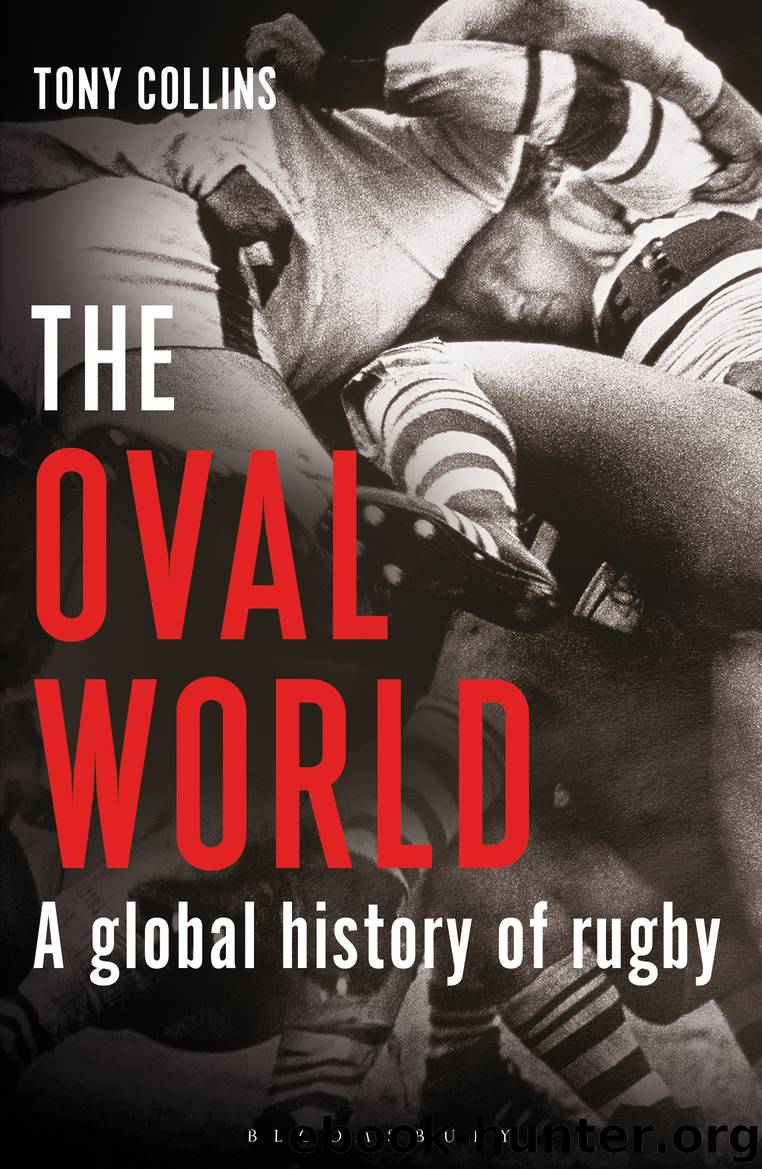The Oval World by Tony Collins

Author:Tony Collins
Language: eng
Format: epub
Publisher: Bloomsbury Publishing
20
RUGBY IN THE SECOND WORLD WAR
For Europe, and ultimately the rest of the world, 1938 was the tipping point. Hitler declared Anschluss in Austria and incorporated his country of birth into the Third Reich. In Spain the civil war had shifted decisively in favour of Franco’s nationalist forces. Government-organised ‘spontaneous’ demonstrations erupted in Italy demanding that France hand over Nice, Corsica and Tunisia to Mussolini. In Romania, King Carol II dismissed parliament and established his own authoritarian dictatorship. The question was no longer if there would be war, but when.
In March 1938, a crowd of 20,000 gathered in Frankfurt to watch the German national rugby union team play France. In 1934 France and Germany, supported by Italy, had established the Fédération Internationale de Rugby Amateur (FIRA) to organise rugby in Europe as an alternative to the International Rugby Football Board. Although France was the dominant power, the Germans played a central role in FIRA, so much so that German was the new organisation’s official language.1
France had played Germany in friendly internationals every year since 1927. In just their second meeting, the Germans had pulled off a shock 17-16 win in Frankfurt. The French did not make the same mistake again and it would be another six years before Germany would score another try against them.
But from 1933 the margins of victory began to grow smaller. In 1934 France had won by a mere four points and at the 1936 final of the European tournament held in Berlin just before the Olympic Games, the French had carried off the title by a converted try. This wasn’t just a story of declining French standards. The Germans lost only two matches against other countries in the 1930s and were clearly Europe’s second rugby power. Now, in 1938, the margin between the two national teams had never been narrower. The match was tight and dominated by forwards. Early in the game the French conceded a penalty in their own half and the experienced German full-back, Hannover’s Georg Isenberg, stepped up and slotted the ball between the posts: 3-0 to Germany.
As the game wore on, the Germans became increasingly confident. Even France’s outstanding centre and captain Joseph Desclaux could not crack the German defence. The French became more desperate, unwilling to concede defeat to a nation that had been playing international rugby for barely a decade. Nothing they tried could break through the German wall of defenders. When referee Herr Krembs finally blew his whistle for no-side, the Germans were exuberant. They were now a European rugby power.
Two months later, the two sides met again in Bucharest in the deciding match of FIRA’s 1938 European Championship. Both had previously defeated the hosts Romania by just three points and the decider was just as close.
At half-time another upset looked to be on the cards as the Germans led 5-3, thanks to a converted try to the German scrum-half and captain Karl Loos. But the French were determined to atone for their earlier shame and a try
Download
This site does not store any files on its server. We only index and link to content provided by other sites. Please contact the content providers to delete copyright contents if any and email us, we'll remove relevant links or contents immediately.
Going Long by Editors of Runner's World(2362)
The Happy Runner by David Roche(2238)
Yoga For Dummies by Georg Feuerstein(1452)
Becoming Boston Strong by Amy Noelle Roe(1390)
Legacy by Kerr James(1294)
Winger by Smith Andrew(1262)
The Little Red Book of Running by Scott Douglas(1205)
Wodehouse At the Wicket by P.G. Wodehouse(1120)
Bowerman and the Men of Oregon by Kenny Moore(1119)
The Way of the Runner by Adharanand Finn(1104)
5050 by Dean Karnazes(1103)
Running Your First Marathon by Andrew Kastor(1075)
Swim, Bike, Run - Eat by Tom Holland(1051)
Blade Runner by Oscar Pistorius(1018)
The Coming Storm by Nigel McCrery(1010)
Spiked (Blocked Book 3) by Jennifer Lane(1001)
The Grade Cricketer by Dave Edwards(985)
The Amazing Test Match Crime by Adrian Alington(978)
The Shared Origins of Football, Rugby, and Soccer by Christopher Rowley(977)
